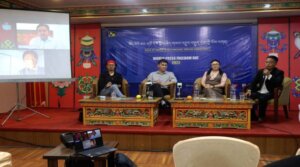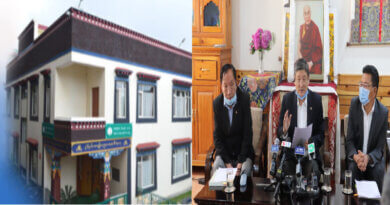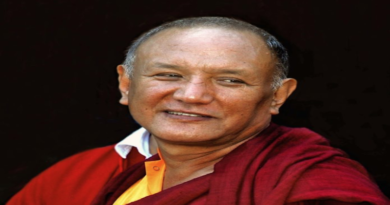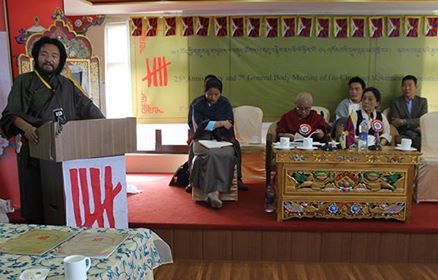Tibetans in exile mark World Press Freedom Day by discussing ‘Role of Media in Advancing Tibetan Democracy’

DHARAMSALA, 3 May: Polarisation and fake news shaking the young exiled Tibetan democracy as it does to societies across the world, a panel observed discussing the “Role of Media in Advancing Tibetan Democracy ”to mark the year’s World Press Freedom Day here.
The panel consisting of media professionals, legislators, activists, digital security experts and independent researchers made the remarks while discussing the challenges and the shortfalls of the Tibetan media in exile at the panel discussion organised by the Tibetan Centre for Human Rights and Democracy (TCHRD).
Speaking on the polarisation, “having good quality news coverage is especially significant and it’s time for the Tibetan press to effectively bridge the gap and the divide” former editor of Phayul.com Sherab Woeser said.
Though he maintained that polarisation in society may not necessarily be something to be looked down on and polarisation based on ideological disagreement is commonplace across politics, he added that personality–based polarisation is a red flag.
Independent researcher Tenzin Nyinjey, added that journalists should serve the public by holding those in power accountable, which in turn will build a strong and resilient community for the Tibetan freedom movement.
He further rued about the lack of reading habits of Tibetans at large and called for more research from journalists while expressing his admiration for the editorial works of late Tsering Wangyal who edited the Tibetan Review from October 1976 to September 1996.
“Editorials such as those of late Tsering Wangyal will greatly serve the community,” he added.
Tibetan writer and activist Tenzin Tsundue also spoke about the lack of reading habits of Tibetans and added that a society that does not read will remain less informed.
He further added that the media should contribute to helping the public form sound and informed opinions.
Additionally, he called for changes in the news coverage of the Tibet tv, run by the Central Tibetan Administration which he said focuses on CTA leaders and their engagements or initiatives that he argued paints a picture of giving more importance to the elected leaders than the public.
Compared to the journalists of free countries, the Tibetans have a greater responsibility with limited resources says Pema Tso, a member of the Tibetan Parliament in exile and the editor of Tibet Times.
She further underscored the role Tibetan journalists play in sourcing news from inside Tibet and breaking it to the world media as well as playing the bridge between the public and the administration.
“As Media is recognised as the fourth pillar of democracy, it plays a significant role in advancing democracy,” said Lobsang Gyatso Sither, member of the Tibetan Parliament in exile and the director of technology at Tibet Action Institute.
“However, with the advent of social media and people relying more on news from such platforms, it’s about time to review the fundamental structure of news media,” he added.
The panel agreed in unison on the nonexistence of press freedom in Tibet under Chinese rule and the challenges posed by the spread of fake news and misinformation that engulf social media like wildfire at times.
While the world celebrates Press Freedom Day, Tibet remains the least-free country in the world.
The US-based watchdog group Freedom House has yet again declared Tibet and Syria as the least-free country in the world in their latest ranking.
The rights group gave Tibet a score of -2/40 for Political rights and 3/60 for civil liberties and an overall ‘Not free’ rating in its annual survey of freedom in the world.
The watchdog declared that “CCP authorities control traditional and social media in Tibet even more strictly than in Han Chinese areas of the country.”
“Individuals who use the internet, social media, or other means to share politically sensitive news content or commentary face arrest and heavy criminal penalties.”
Freedom House stated in its annual report that “Tibetans who communicate with foreign media or other foreign contacts without permission face criminal prosecution and long prison sentences.”
Additionally, China was ranked 175th out of 180 countries scored by the Reporters Without Borders (RSF) for press freedom in its 2022 press freedom index.
Just as this year’s World Press Freedom Day theme “Journalism under digital siege,” spotlights the multiple ways in which journalism is endangered by surveillance and digitally-mediated attacks on journalists, and the consequences of all this on public trust in digital communications, the report declared that the threats to the freedom of journalists and media workers are growing by the day in Tibet.
“Without freedom of the press, there are no real democratic societies. Without freedom of the press, there is no freedom.” the UN Secretary-General Antonio Guterres has said in a statement issued to observe the day.
World Press Freedom Day serves as a reminder of the significance of a free press in a safe and functioning society and acts to honour the journalists who have lost their lives while supporting a free press.
Freedom of expression is a basic human right as listed in the Universal Declaration of Human Rights, Article 19. It was initially arranged in 1993 by the United Nations General Assembly as an initiative to reflect upon the freedom of the press internationally.
The day was marked on the jubilee of the Declaration of Windhoek, which is a statement of fundamentals of press freedom assembled in 1991 by the African Journalists to encourage a pluralistic and independent African press. exposing lies, and building strong, resilient institutions and societies






